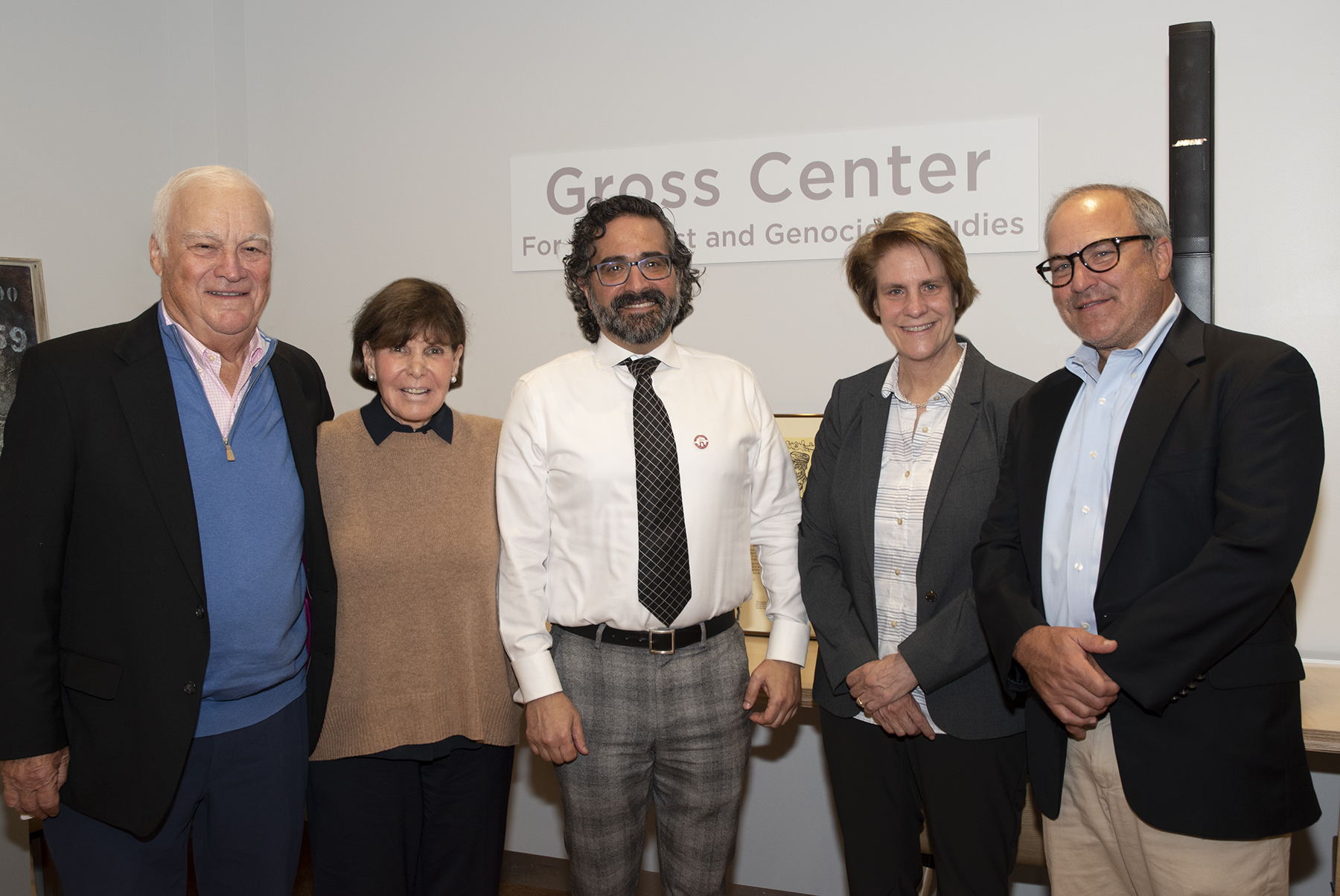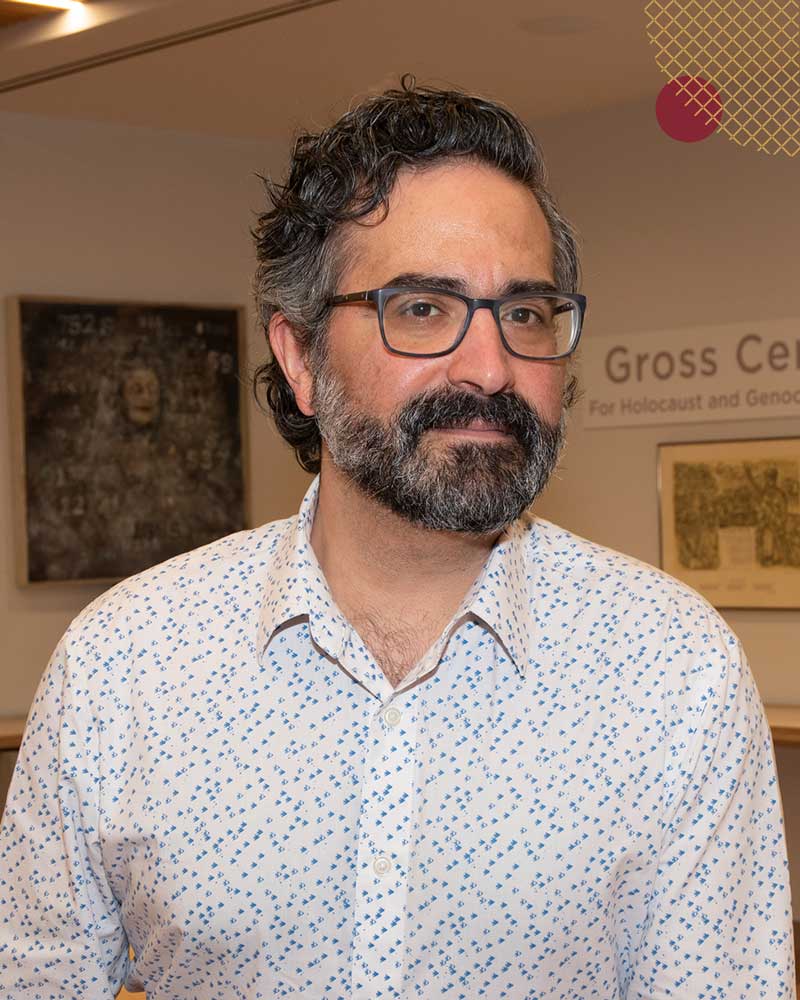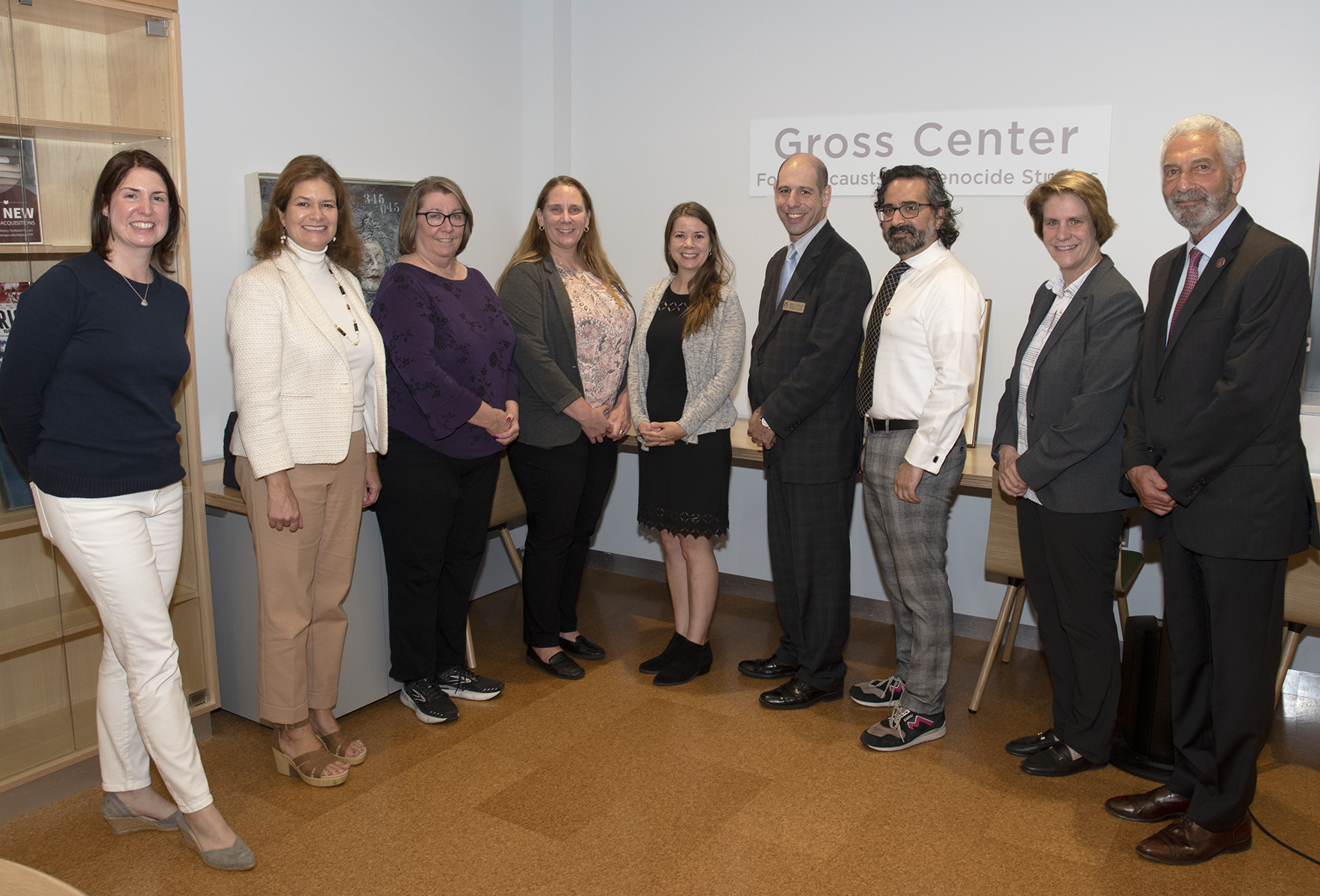Campus News | Short Read
Q & A with Center for Holocaust and Genocide Studies Director Jacob Ari Labendz

Left to right: Paul Gross, Gayle Gross, Jacob Labendz, President Cindy Jebb, Roger Gross
Winter 2023
What is/are your goal(s) as director of the Center?
The Center for Holocaust and Genocide Studies should function as a central node of contact and cooperation between the diverse units, communities, and individuals across Ramapo Campus—for everyone who shares our commitment to learning from the histories of the Holocaust and genocide.
We, at the Center, have additionally committed ourselves to continue serving as a valued resource for the entire region, for communities that have known or are experiencing genocide, and for public and private institutions who share in our responsibility to provide instruction and education about the Holocaust, genocide, racism, antisemitism, and other forms of bigotry and oppression.
My greatest goal, and perhaps the most challenging, is to integrate these two areas of operation; to find opportunities for Ramapo students to assume meaningful roles in our work, both on and beyond campus. This November, four students from my course on the history of the Holocaust shared their research projects at a Kristallnacht commemoration co-sponsored and hosted by Congregation Beth Haverim Shir Shalom in Mahwah. They created Story Maps—narrative mapping presentations—based upon survivor testimonies recorded at the Center with individuals who witnessed Kristallnacht and settled in our region. I cannot stop thinking about that night, which offered Ramapo students an opportunity to understand how deeply the local Jewish community values their dedication, and which demonstrated to the community the commitment of Ramapo students to keeping their stories alive. In short, I want my students to know how much their work can matter, how much we rely upon them to build a better future, and how consequential their Ramapo education will be as they strive to meet their goals.
What challenges and opportunities lay before the Center in 2023?
The Center manifests Ramapo College’s commitment to preparing our students to help shape a safer future by learning from past and ongoing horrors. We face numerous challenges, including the apparent rise and normalization of racism, antisemitism, and other bigotries in the public sphere—a problem compounded by the emergence of “post-truth” politics and media. As a Holocaust educator, I additionally worry about the passing of the survivor generation. They, as living witnesses, undermined Holocaust denial and relativization. They have also played memorable roles in our educational and commemorative programs. Our greatest challenge is also our most promising opportunity: to refashion Holocaust and genocide education for the 21st century. I am grateful that Ramapo College has entrusted me to lead this work on campus, and look forward to learning from and with my students about the needs of their generation. We live in times both concerning and exciting. Our challenge and opportunity is to preserve what is best from past practices, while embracing an unknown and often scary future. We will do so by uniting people in study and action. The more we learn and commemorate together, I hope, the better we will be at living together and for each other. This begins, of course, with our students.
About
Dr. Jacob Ari Labendz

Dr. Jacob Ari Labendz directs the Center for Holocaust and Genocide Studies at Ramapo College, which offers educational programming for campus and regional communities through individual events and lasting partnerships. He teaches courses on related topics, which students may take to complete a minor in Human Rights and Genocide Studies. Dr. Labendz also offers courses in Jewish history, which serve the Judaic Studies Minor available to students. He researches and writes about the history of Jews in communist Czechoslovakia and contributes actively to discussions around contemporary antisemitism and nationalism, Holocaust memory and legacies, and Jewish veganism. Dr. Labendz grew up in northern NJ and is thrilled to have returned home after twenty-seven years with his partner and two dogs.

Center Advisory Board
Left to right: Christina Conner, Librarian; Susan Hangen, Interim Dean, School of Humanities and Global Studies; Colleen Tambuscio, Holocaust Educator; Susan Gaulden, Interim Provost & Vice President Teaching, Learning and Growth; Rebecca Root, Professor of Political Science and International Studies; David Terdiman, Assistant Vice President, Institutional Advancement; Jacob Labendz, Director, Center for Holocaust/ Genocide Studies; Cindy Jebb, President Ramapo College; Stan Richmond, Ramapo College Benefactor
What programming can the Ramapo College community and surrounding external communities look forward to this year?
I am particularly proud to announce that the Center has acquired a Torah scroll from the City of Kolín (now in the Czech Republic), which survived the Holocaust. We owe thanks to the Memorial Scrolls Trust and to our generous sponsors, Cipora Schwartz and Dr. Susan Gaulden. After a welcoming ceremony later this Spring 2023 semester, which we will announce shortly, the scroll will be available for public viewing and for use in courses and educational programs. In time, we hope for the Center to serve as the nexus of a multi-site exhibit uniting institutions—mostly but not only synagogues—which have Czech scrolls of their own. This past semester, students in my Holocaust course, who got an early peek at the scroll, had the option to prepare texts for use in our future exhibit. I look forward to drawing upon them for that purpose.
This semester, we will also resume our free workshops for educators seeking enrichment as teachers of the Holocaust and genocide. Our workshop will feature a virtual tour of Auschwitz conducted live by an expert guide with decades of experience. In addition to an exciting array of lectures and programs, we will host and co-sponsor commemorations of the Holocaust and the Armenian Genocide, both on and off campus. I am especially excited for the Center to become more deeply involved in Ramapo College’s effort to establish a more meaningful relationship with the Ramapough Lenape Nation.
What do you imagine the Center to look like in five years?
At the end of five years, if not before, I would like to have a clear vision of what the Center has to offer that is unique and needed in our region. I want to be sure that the public sees the Center as their home for Holocaust and genocide education and as a resource for thinking about antisemitism, racism, and other bigotries. Through this vital effort, I foresee our institutional partners deepening their relationships with Ramapo College.
Programmatically, I hope to have expanded our teacher-training programs in partnership with state and regional organizations, as well as the appropriate units across Ramapo campus. New Jersey was the first state to mandate Holocaust and genocide education in elementary and high schools. We will help ensure its quality by working with everyone from teachers-in-training (at Ramapo and beyond) to seasoned professionals across the state.
Students, of course, will remain our top priority. In five years, I hope to look back on a successful revision and expansion of our courses, including opportunities to study abroad. I would like to have established more robust and formal partnerships across campus to provide more varied access for students to our resources and programs—what we teach is important for all! I would be thrilled if we developed a tradition of Ramapo students taking active roles in our public facing events as part of their education.
